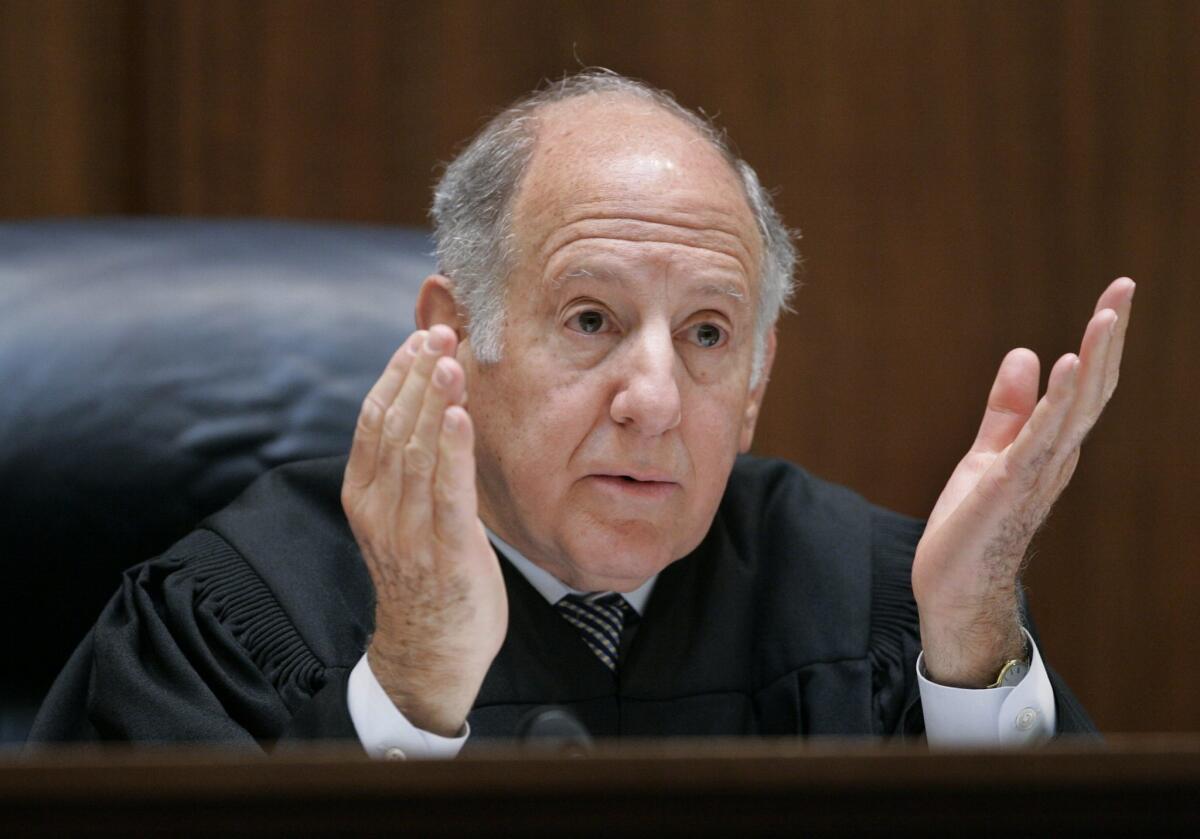Prop. 8: Ronald George thinks Calif. voters would OK gay marriage

- Share via
SAN FRANCISCO -- Ronald M. George, the California Chief Justice who wrote the historic 2008 ruling that gave same-sex couples the right to marry, is now retired. He was on a conference call Tuesday morning about efforts to reform California’s initiative process and did not now how the arguments had gone until noon.
“It’s been in the back of my mind,” said George, 73, a moderate Republican who retired from the court on Jan. 1, 2010. “This is something I could see coming back in 2004. It was a gathering storm.”
The state high court invalidated the marriages then-Mayor Gavin Newsom had permitted in violation of state law, but ruled 4 to 3 in 2008 that California’s marriage ban violated the state constitution. The ruling also was the first from any state high court to raise constitutional protections for gays and lesbians to the level reserved for race.
Almost exactly a year later, George wrote the 6-1 ruling that upheld Prop. 8 as a valid state constitutional amendment.
“As we knew it would be, the case ended up in our lap,” George said. He recalled a cartoon in a legal newspaper that showed a depiction of Newsom standing on top of San Francisco City Hall swinging a wrecking ball toward the California Supreme Court building across the street. There was a depiction of George on top of the state building.
“The caption was, ‘The ball is in your court,’ ” George recalled, chuckling.
He said strangers still approach him on the street and in restaurants to thank him for the marriage decision. He not only was its author but he provided the swing vote in the 4-3 ruling.
“It is rather amazing to me that so many of them do,” he said. “I have had people even now, in 2013, come up and thank me, sometimes very warmly, for the decision.”
He said every court case was extremely important to those involved, but the marriage decision he wrote was one that affected so many lives. He said the current litigation matters to him “intellectually.”
“I feel it was unfortunate that Prop. 8 passed, in part because of out-of-state money coming in and maybe tipping the scales,” he said. “And by the same token, the campaign against Prop. 8 was not as effectively run as it could have been, in my view.
“But having said that, the people have a right to amend to their Constitution.”
He said he believes a ballot measure to restore marriage rights to gays would “pass readily” today.
That marriage rights for gay Californians ended up in federal court and the case was only now being reviewed by the U.S. Supreme Court did not surprise him.
“I know that some of these things evoke a memory of Dickens’ ‘Bleak House,’ but having become accustomed to that, it doesn’t surprise me this is still going on.”
He said he could empathize with the U.S. Supreme Court justices hearing the case “because judges invariably are called upon to put aside whatever strong views they may have personally and apply the law.”
“That is certainly what I did” in writing the 2009 ruling that upheld Prop. 8 as a valid constitutional amendment, he said.
He declined to provide legal analysis of the current case, explaining that he still had the judge’s instinct to remain apart of the fray and be neutral.
He said he was going to look at news accounts of the hearing but wasn’t particularly interested in listening to the tape.
“I have got other things to do,” he said. “I certainly know that although it may be entertaining to read the account of the hearing or hear the actual oral argument, it is often not the best of clue of how the court is going to come out.”
Justices ask questions to be a devil’s advocate, “to push somebody to the logical conclusion of the point they are trying to make, to try to expose weaknesses in an argument or attempt to prop up an argument or attempt to make a point with somebody three or four seats down on the bench,” George noted.
“There are so many different reasons why questions are asked at oral argument. It really is rare” for a justice to clearly show where he or she stands with a question, he said.
George is working on an oral memoir, which will be published in the fall, of his 38 years on the bench and the seven years preceding when he worked as a deputy attorney general.
He said his days are spent writing and reading and doing “the ordinary activities of a retiree.”
ALSO:
Motive unclear in slaying of East Hollywood man, police say
Man who set himself on fire in nail salon not expected to survive
Lesbian cousin of Supreme Court’s chief justice to attend Prop. 8 hearing
Twitter: @mauradolan
More to Read
Sign up for Essential California
The most important California stories and recommendations in your inbox every morning.
You may occasionally receive promotional content from the Los Angeles Times.










